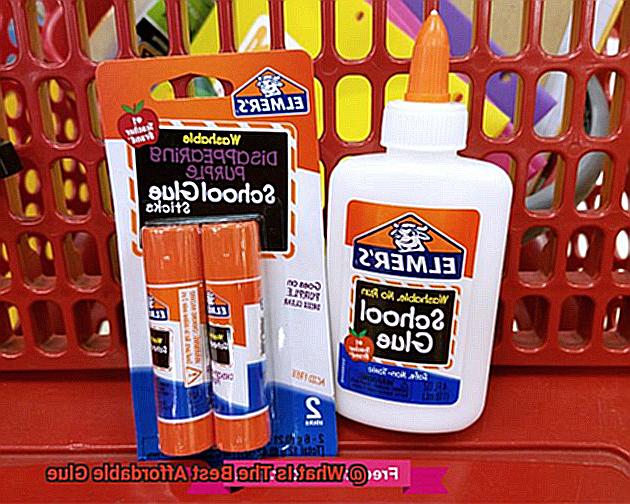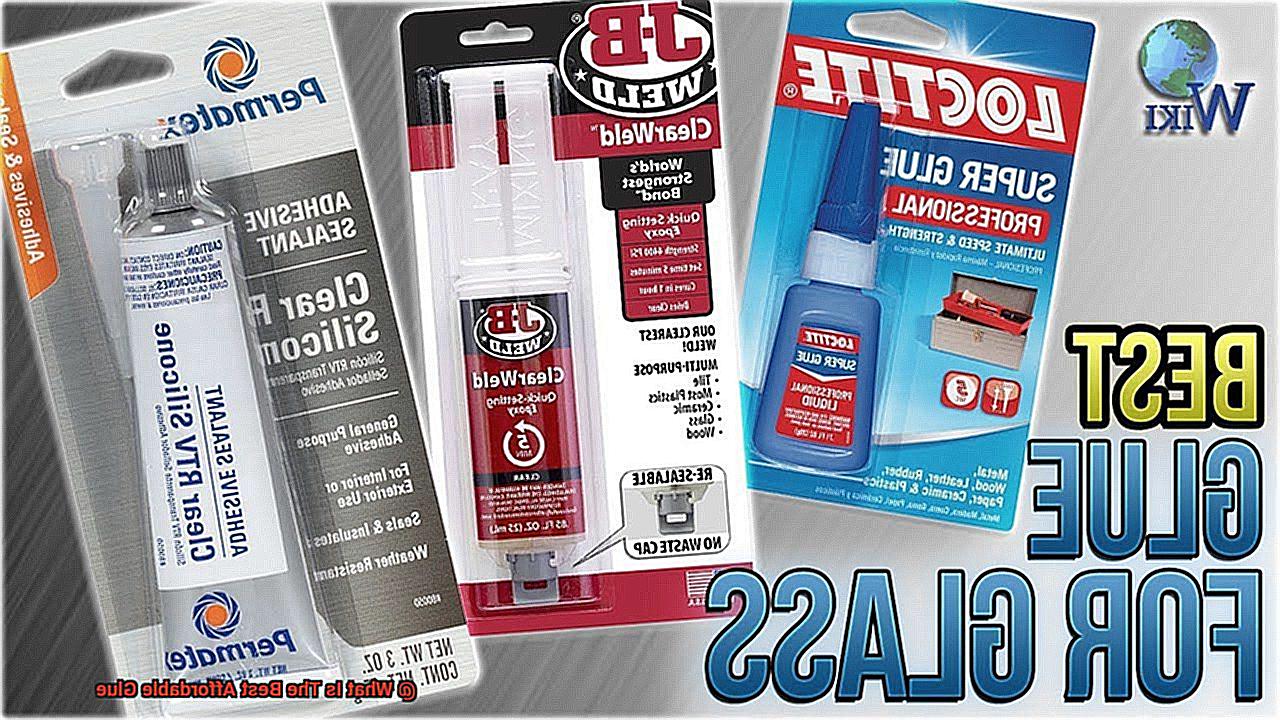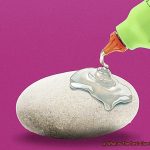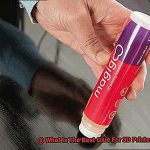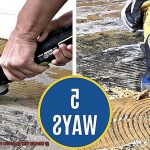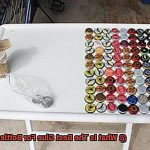Epoxy adhesives are two-part glues that consist of a resin and a hardener. When mixed together, they create a strong bond that is resistant to heat, water, chemicals, and impact. Epoxy is commonly used in construction, automotive repairs, and DIY projects that require a durable bond. It can be used on various materials such as metal, plastic, glass, ceramic, and wood.
Hot Glue:
Hot glue is a thermoplastic adhesive that is applied using a hot glue gun. It is widely used in crafting, DIY projects, and even in industrial applications. Hot glue bonds quickly and is suitable for a wide range of materials, including paper, cardboard, fabric, plastic, and even certain metals. However, it is not recommended for heat-sensitive materials or items that will be exposed to high temperatures.
Wood Glue:
As the name suggests, wood glue is specifically formulated for woodworking projects. It creates a strong bond on wood surfaces and is designed to withstand the stress and strain that wood joints often endure. Wood glue comes in different types such as yellow glue, which has a longer drying time and allows for repositioning of the pieces, and polyurethane glue, which expands when cured to fill gaps in the wood.
Fabric Glue:
Fabric glue is a specialized adhesive designed for bonding fabric materials together. It is commonly used in sewing projects, fabric repairs, and crafting. Fabric glue is flexible and dries clear, making it ideal for hemming garments, attaching patches or appliques, and creating fabric crafts. It is important to choose a fabric glue that is compatible with the type of fabric you are using.
Spray Adhesive:
Spray adhesive is a versatile adhesive that comes in aerosol form. It provides a quick and even application of adhesive onto surfaces. Spray adhesives are commonly used in arts and crafts projects, upholstery work, and for bonding lightweight materials such as paper, foam, and fabric. They can provide temporary or permanent bonds depending on the specific product.
PVA Glue: An Affordable Option for General Crafts
Let’s delve into why this adhesive is the go-to choice for general crafts.
First and foremost, PVA glue is incredibly affordable. Crafters can save big when opting for PVA glue over other adhesive options. With its accessible price point, creativity knows no bounds.
Versatility is another standout feature of PVA glue. It effortlessly bonds an array of materials. From paper and fabric to wood and select plastics, PVA glue has you covered. No matter the craft, PVA glue rises to the challenge.
Ease of use is yet another advantage of this magical adhesive. Available in liquid form, PVA glue can be applied with a brush or nozzle, simplifying the crafting experience. Its consistency ensures even coverage, leaving no room for imperfections.
PVA glue can be customized to suit your crafting needs. By mixing it with water, you can achieve a thinner consistency perfect for paper mache or creating a transparent glaze. Additionally, mix in colorants or pigments to create bespoke shades, adding another layer of creativity to your projects.
Safety is paramount when it comes to crafting, especially for our little artists. Thankfully, PVA glue is generally non-toxic and safe for children when used as directed. However, always double-check the label and follow any recommended safety precautions provided by the manufacturer.
Epoxy Resin: A Durable and Versatile Choice
- Epoxy resin: a durable and versatile choice for glue. When it comes to selecting the best adhesive, epoxy resin stands out for its exceptional strength and adaptability. Here’s why it’s the top choice:
- Unmatched strength: Epoxy resin boasts a high tensile strength, making it perfect for bonding heavy materials or objects that undergo constant stress or movement. It can withstand significant pressure and tension without breaking or coming apart.
- Defying the elements: Epoxy resin is highly resistant to moisture, chemicals, and temperature fluctuations. Be it water, sunlight, or harsh chemicals, this adhesive remains unaffected, retaining its adhesive properties. Its heat resistance also makes it reliable for projects involving high temperatures.
- Versatility at its finest: Epoxy resin can be used on a wide range of materials including wood, metal, glass, ceramics, plastics, and even fabric. This versatility makes it a go-to choice for DIY projects, repairs, and crafts.
- Time on your side: Unlike some adhesives with quick curing times, epoxy resin provides ample time for proper positioning and adjustment before it sets. This flexibility allows users to work on intricate projects or make necessary adjustments without rushing.
- Power over porosity: Epoxy resin has the ability to penetrate into the pores of materials such as wood or concrete, creating a strong bond that firmly holds the pieces together. Its excellent bonding strength on porous surfaces sets it apart from other adhesives.
- A wise investment: While epoxy resin may have a higher initial cost compared to other glues, its exceptional durability and longevity make it a cost-effective choice in the long run. With epoxy resin, you can expect your bonds to last for years, reducing the need for frequent repairs or replacements.
Super Glue: Quick and Strong Bonds
Super glue, also known as cyanoacrylate adhesive, is a remarkable adhesive that creates quick and strong bonds. Its unique properties make it a popular choice for various applications, including crafting, repairs, and even medical purposes.
Super glue achieves its impressive bonding capabilities through a chemical reaction triggered by moisture. When it comes into contact with water vapor in the air or moisture on surfaces, the glue rapidly polymerizes, transforming from a liquid state to a solid state within seconds. This quick transformation allows for immediate adhesion and minimizes the need for clamping or holding materials together for extended periods.
During the chemical reaction, the cyanoacrylate molecules link together, forming long chains called polymers. These polymers create a web-like structure that binds the surfaces together tightly. The result is a strong bond that can withstand significant force and stress once fully cured.
To optimize the effectiveness of super glue, it is recommended to apply it in thin layers. Excess glue may take longer to cure and could potentially weaken the bond. Thin layers allow for better contact between the adhesive and the surfaces being bonded.
Super glue is versatile in its compatibility with various materials, including metal, plastic, rubber, ceramics, and wood. However, it may not be suitable for bonding certain types of plastics or materials that are oily or greasy. It is essential to consider the specific materials being bonded and choose the appropriate formulation of super glue accordingly.
Super glue is available in different formulations, such as gel-based or liquid forms. Gel-based super glues offer more control during application and are less likely to run or drip. Choosing the right formulation can enhance the ease of use and effectiveness of the adhesive.
Fabric Glue: For Bonding Fabrics Without Damage
Fabric glue is a revolutionary tool that allows you to bond fabrics together without causing any damage or discoloration. It’s a game-changer for all your fabric projects, from hemming pants to repairing tears in clothing. Here’s why fabric glue should be your go-to adhesive:
- Flexibility: Fabric glue is specially designed to be flexible, ensuring that the bonded fabric can stretch and move without tearing or breaking the bond. This is especially crucial for garments and other fabric items that need to maintain their flexibility.
- Durability: With fabric glue, you can create a strong bond that can withstand repeated washing and wear. No matter how many times you use or wash your fabric project, the bond will hold strong.
- Washability: Unlike regular glue, fabric glue is specifically formulated to be washable. This means you can safely launder fabric items bonded with fabric glue without worrying about the bond deteriorating or coming apart.
- Ease of use: Applying fabric glue is a breeze. You don’t need any sewing skills or additional tools. Just squeeze a small amount onto one fabric surface, press the two pieces together, and let it dry according to the manufacturer’s instructions.
- Versatility: Fabric glue works on various types of fabrics, including lightweight cotton, polyester, denim, and even upholstery materials. There are different types of fabric glues available, each formulated for different fabric weights and purposes.
While fabric glue offers incredible benefits, there are a few things to consider:
- Limited repositioning: Once fabric glue is applied and dried, it forms a permanent bond. You have limited time to make adjustments or reposition the fabrics before the bond sets.
- Potential damage to delicate fabrics: While fabric glue is generally safe for most fabrics, it may not be suitable for delicate or sensitive materials like silk or satin. Always test a small area of the fabric before applying the glue to avoid any damage or discoloration.
- Limited strength for heavy-duty applications: While fabric glue is durable, it may not be as strong as sewing or other fabric bonding methods for heavy-duty applications. Consider the strength requirements of your project before relying solely on fabric glue.
Balancing Affordability with Quality
Balancing affordability with quality when purchasing glue requires careful consideration of several factors:
- Specific requirements: Different glues have different properties and strengths. Assess the needs of your project to determine the necessary qualities in a glue. For temporary projects, a less expensive glue may suffice, while more permanent applications may require a higher-quality adhesive.
- Comparison of brands and options: Well-known brands often come with a reputation for high quality, but they can be more expensive. Lesser-known brands may offer similar performance at a lower cost. Read reviews and seek recommendations from other users who have tested different glues to gain valuable insights.
- Affordability does not mean low quality: Many manufacturers offer budget-friendly options without compromising on performance. Research and try out different glues to identify affordable yet effective options.
- Consider overall value: Price alone should not be the sole determining factor. Evaluate factors such as quantity, ease of use, durability, and longevity to determine the long-term cost-effectiveness of a glue. Sometimes, investing in a slightly more expensive glue that lasts longer or requires less frequent reapplication can save money in the long run.
Finding the Best Affordable Glue Within a Brand or Range
When it comes to finding the best affordable glue within a brand or range, there are a few key points to consider. These factors will help you narrow down your options and choose a glue that is not only affordable but also meets your specific needs and provides reliable bonding for your projects.
- Identify your project’s needs: Different glues are formulated for different materials and applications. Consider the specific materials or surfaces you will be working with and choose a glue that is compatible with them. This will ensure a strong and durable bond.
- Research the brand or range: Once you have identified the brand or range of glues you’re interested in, research the different types available within that brand. Look for information on their specifications, features, and recommended applications. This will help you find the most suitable glue for your project.
- Consider the application method: Glues come in various forms such as squeeze bottles, applicators, tubes, or cans. Choose an application method that is most convenient and practical for your project.
- Read reviews and testimonials: Feedback from other users can provide valuable insights into the performance and affordability of the glues. Look for reviews on factors such as drying time, adhesive strength, ease of use, and overall value for money.
- Compare prices and budget: While affordability is important, prioritize quality and performance. Sometimes a slightly higher-priced glue that offers superior bonding capabilities is a better long-term investment than a cheaper option that doesn’t deliver satisfactory results.
g8XxEFBfPVE” >
Conclusion
In conclusion, don’t let the task of finding the best affordable glue overwhelm you. By carefully considering your specific needs and doing some research, you can discover a glue that combines affordability with quality. Throughout this article, we’ve delved into various types of glues and their applications, highlighting what makes them great and where they may fall short.
For general crafts, PVA glue is a fantastic option. It’s not only affordable but also versatile, easy to use, customizable, and safe. If you’re looking for durability and versatility, epoxy resin is the way to go. Its unmatched strength, resistance to the elements, adaptability to different materials, ample working time, power over porosity, and long-lasting properties make it a top choice.
When it comes to quick-drying and strong bonds on multiple surfaces, super glue steals the show. It’s perfect for projects that require immediate adhesion. On the other hand, fabric glue offers flexibility, durability, washability, and ease of use while preserving the integrity of fabrics.
When seeking that perfect balance between affordability and quality in your glue purchases, take into account your project’s specific requirements. Compare different brands and options to find one that fits your needs perfectly. Remember that affordable glues can deliver exceptional performance without sacrificing quality. And don’t forget about factors like overall value and long-term cost-effectiveness – they’ll help you make an informed decision.
Lastly, when searching for the best affordable glue within a brand or range, dive deep into identifying your project needs. Researching specifications/features/recommended applications/applicators/tubes/cans/prices/budgets/reviews/testimonials will be your guiding light towards finding an adhesive that suits you just right.
So go ahead – start your crafting journey with confidence. Armed with this knowledge on choosing the best affordable glue for your projects, there’s no limit to what you can create.
